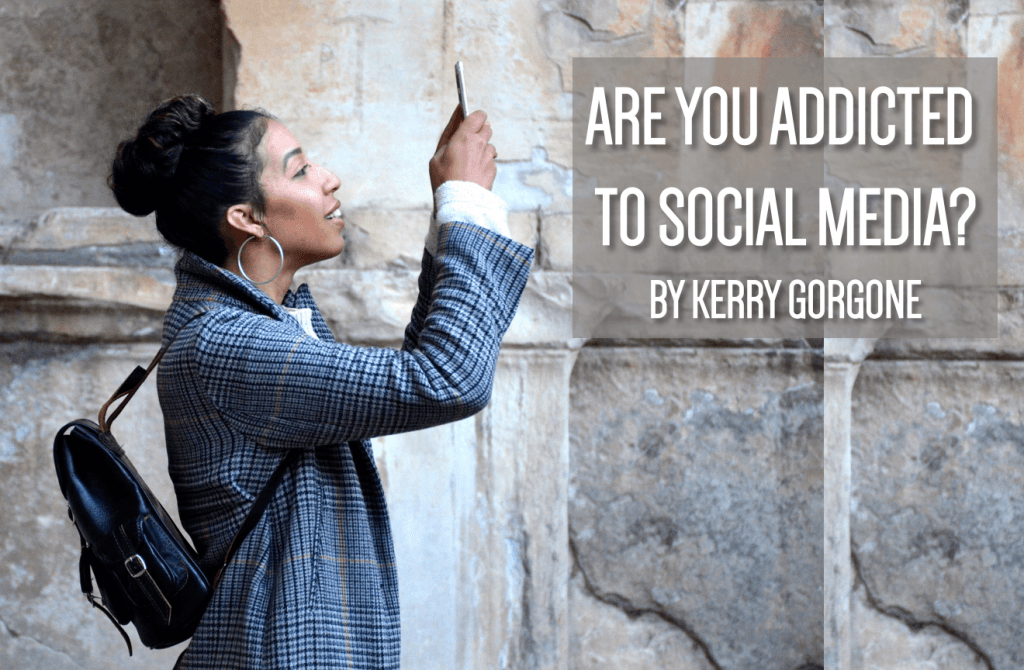
By Kerry Gorgone, {grow} Contributing Columnist
Would you devote five years of your life to social media? You might think “no way,” but statistically, you’re already on track to do just that. Based on their current daily behavior, an average person will spend more than five years of his or her life using social media. (Source: Mediakix study)
But you can change that. It’s not like you’re addicted to social media, right? Not so fast.
I wrote on this blog back in 2015 about the rise of social media addiction, and the condition has become more prevalent since. Adam Alter explores the rise in “addictive technology” in his book, Irresistible: The Rise of Addictive Technology and the Business of Keeping Us Hooked.
“The people who create and refine tech, games, and interactive experiences are very good at what they do,” says Alter. “They run thousands of tests with millions of users to learn which tweaks work and which ones don’t—which background colors, fonts, and audio tones maximize engagement and minimize frustration. As an experience evolves, it becomes an irresistible, weaponized version of the experience it once was. In 2004, Facebook was fun; in 2016, it’s addictive.” (Read an excerpt of Irresistible on Wired.com.)
Social media exploits human psychology
Even people who were instrumental in bringing us social networking sites like Facebook have called into question the ethics of this technology. Facebook co-founder Sean Parker made headlines recently for saying that the site “exploits human psychology,” and the engineer who created the “Like” button now says our minds are being “hijacked” by Facebook. Social media has even been compared to Big Tobacco.
The phenomenon is closely linked to smartphone addiction. A recent study found that, on average people touch their mobile phones 2,617 times a day. Social media comprised 22 percent of these interactions.
But when do you cross the line from “heavy use” into addiction? Psychology Today explains addiction as “a condition that results when a person ingests a substance (e.g., alcohol, cocaine, nicotine) or engages in an activity (e.g., gambling, sex, shopping) that can be pleasurable but the continuation of which becomes compulsive and interferes with ordinary responsibilities and concerns, such as work, relationships, or health.”
Are you experiencing social media addiction?
Ask yourself this: Has social media ever “interfered with ordinary responsibilities and concerns,” like watching your child’s soccer game, cooking dinner, replying to a work email, or actively engaging in conversation with a friend who’s right in front of you? If so, you’re likely in good company: there are an estimated 2.46 billion social media users worldwide. That’s a lot of Likes and RTs!
Here are three tips for taking your life back:
1) Log Your Time
You could manually track your time, but if you want an honest assessment of how much time you spend on social media, an app like Antisocial or In Moment might be easier (and less apt to fudge). It might seem ironic to use a mobile app to minimize the number of times you swipe and tap, but give it a shot.
2) Set Limits
If you (or those closest to you) feel that your social media use is detrimentally affecting other aspects of your life, set some limits.
Try an app like Freedom. It works across multiple devices and is compatible with Mac OS X 10.8-10.12, Windows Vista, 7, 8, and 10, and iOS 9+. Basically, it helps you manage access to certain websites and apps across their desktops, laptops, tablets, and smartphones.
For computer use, there are browser extensions that can help. StayFocusd for Chrome enables you to limit the time per day you spend on websites you find distracting. You could take a stricter tack and use a blocker like Cold Turkey (supports all major browsers and works with Mac, Windows, and Android). Experiment with different apps and settings: make adjustments until you strike the right balance for you.
3) Know Yourself
This might be the simplest advice, but it can be the hardest to follow. If you know you can’t resist browsing Facebook from the sidelines during your kids’ games, delete the app from your phone. If you Instagram while driving, stop. Seriously, it could kill you. Stash your phone in the passenger door well until you arrive at your destination.

One strategy I use: filing. I created a “Waste of Time” folder on my iPhone to hold all the apps I want to use less often, including Facebook, Twitter, Instagram, Words With Friends, etc.
And remember, social media is engineered to be addictive, but that doesn’t mean it makes you happy. Research shows it can actually make you feel sad, depressed, and isolated, so limiting your social media use can pay dividends in terms of mental health as well as improving productivity and relationships.
As with everything – chocolate, cheese, gaming, social media – moderation is key. Just like you hide the Halloween candy so you don’t overindulge, hiding certain apps temporarily can help you to reclaim some of your precious time.
But what if you’re not the one with the problem?
Many of us say that we don’t have a social media problem, but we all know someone who does. If that someone is a close friend, family member, or significant other, their social media addiction can have an incredible impact on your day to day life. There’s even a term now for snubbing someone by screwing around with your phone. (It’s called “phubbing.”)
Just as you examine your own social media use to see if it interferes with other areas of your life, consider how your loved one’s social habit is affecting your family dynamic. Do they check Facebook or Instagram while driving? Do they keep their phone on the table during dinner so they can see who liked their Instagram of won ton soup? Do they look up when you walk into the living room or just grunt vaguely while their eyes stay glued to the screen in their hand? If you don’t like the answers to any of these questions, take action.
Tips for Helping a Loved One You Suspect is Addicted to Social Media
- Broach the subject (but tread carefully). People get defensive when confronted about things like excessive social media use. Explain that you are concerned for his or her safety (if they’re Facebooking while driving, for example), or that you miss their company during dinner.
- Incorporate some praise. You might feel neglected and angry, but it will help you both if you can maintain some positivity during this conversation. Talk about what a great parent he or she is, and how watching them play outside with the kids is one of your favorite things. Talk about how much their advice has helped you when you’ve had difficulty at work. Acknowledge their good attributes, so you can emphasize how much their mental absence hurts you.
- Set limits. Propose a family-wide ban on devices at the dinner table. Put your charging station in a kitchen cabinet and stow phones when you get home from work. Establish “Social Media Free Sundays.” Just remember, whatever rules you propose, be prepared to abide by them yourself. This isn’t just about your loved one’s social media addiction—it’s about your relationship and your family.
If your loved one won’t listen when you broach the subject or if the limits you set don’t do the trick, you might need to propose more formal treatment. Addiction recovery centers (like this one and this one) have begun to offer social media addiction therapy. One FastCompany writer documented her experience using the online provider TalkSpace for “social media dependency therapy,” if you want to see what this type of treatment might entail.
If things have gotten really out of hand, you might want to try a total digital detox. Camp Grounded and Digital Detox offer tech-free retreats.
Whatever you do, don’t whip out your own phone in retaliation and lose yourself in Words With Friends. Otherwise, you could wind up spending years parked on the couch next to your best friend / spouse / kid in total silence (except for the occasional ruckus that breaks out when a video online is set to autoplay). Model a balanced approach to social for your family. You’ll be happy you did once your kids are teenagers!
And share this post, but only if you were already on social. Otherwise, it can wait.

Kerry O’Shea Gorgone is a writer, lawyer, speaker and educator. She’s also Director of Product Strategy, Training, at MarketingProfs. Kerry hosts the weekly Marketing Smarts podcast. Find Kerry on Twitter. I
Illustration courtesy Unsplash.com
The post Social Media Addiction is Real: How to Take Your Life Back appeared first on Schaefer Marketing Solutions: We Help Businesses {grow}.
from {grow} http://feeds.feedblitz.com/~/492889864/0/markgrow~Social-Media-Addiction-is-Real-How-to-Take-Your-Life-Back/
No comments:
Post a Comment